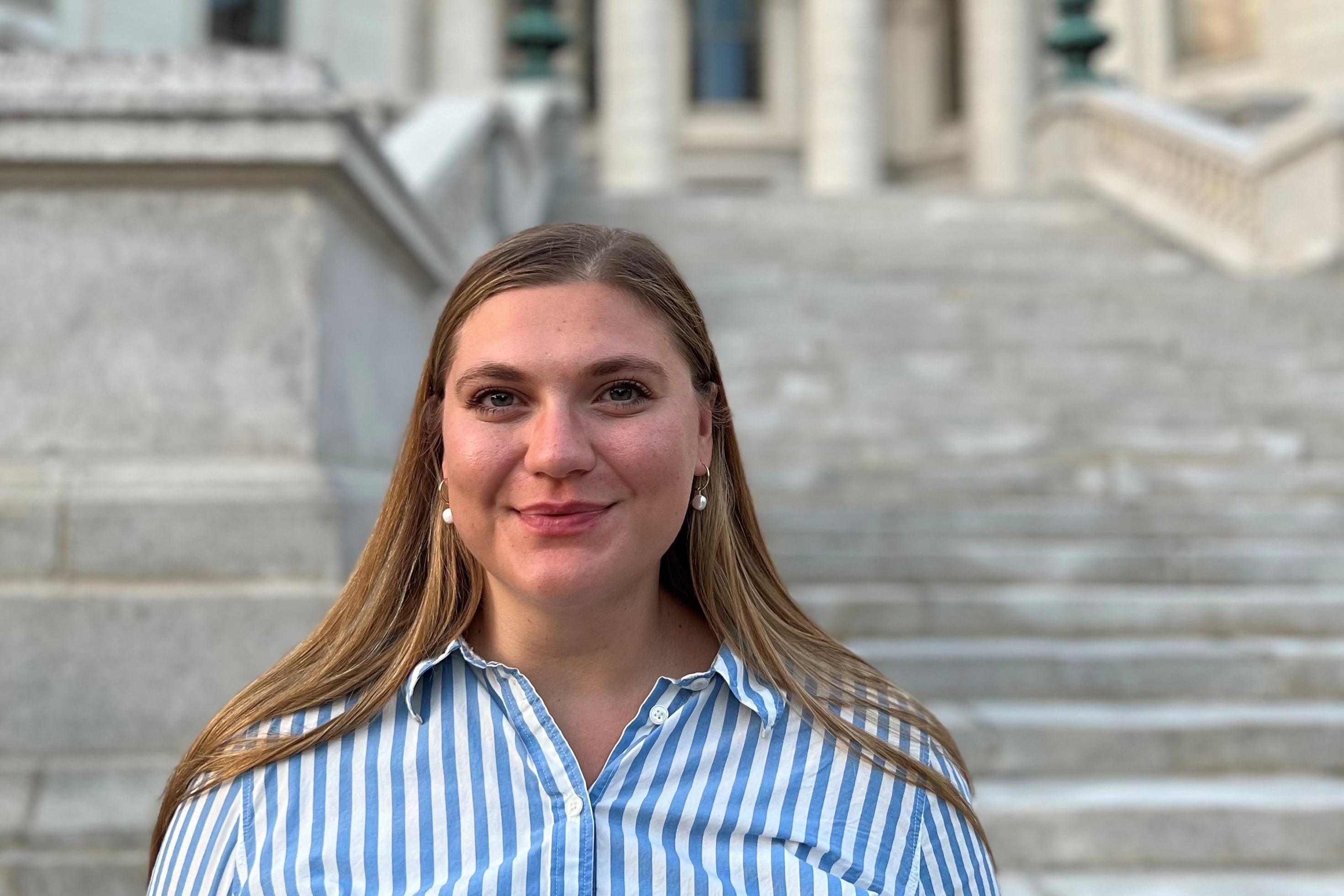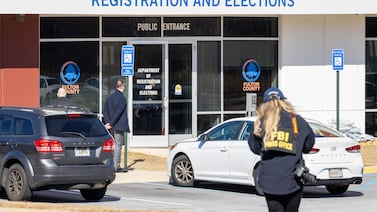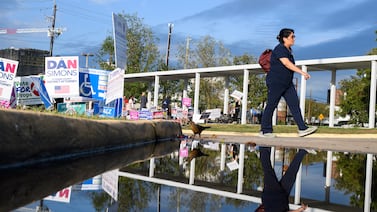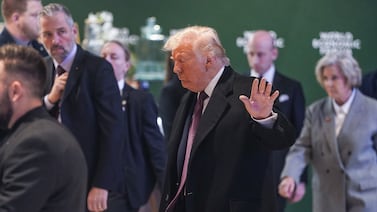Votebeat is a nonprofit news organization reporting on voting access and election administration across the U.S. Sign up for Votebeat Wisconsin’s free newsletter here.
As a 19-year-old election worker in Hennepin County, Minnesota, Lydia McComas discovered how meaningful it was to help voters navigate the process. Less than a decade later, she’s the city clerk in Madison, Wisconsin, overseeing one of the most scrutinized election offices in the state and working to rebuild trust after last year’s ballot mishandling scandal.
Between those two points, McComas followed an unusually direct path: a college internship supporting elections planning, then a full-time job in a county elections office along with a graduate program in election administration.
She’s part of an emerging generation of officials who set out early and very intentionally, through internships and university training, to make a career out of election work. Driving this movement toward professionalized election administration are veterans of the field who recognize the need to replace retiring clerks and have spent years creating a stronger, more sustainable pipeline.
Together they are transforming a profession once dominated by civic-minded volunteers and on-the-job learners.
“I’d love for more young people to get involved with election administration and explore it as a future career,” McComas told Votebeat in an interview.
For now, McComas is an outlier in Wisconsin: At 28, she’s among the youngest to hold a municipal clerk position — and one of the few who pursued the election profession, on purpose, from the outset. Nearly 80% of the state’s chief election officials are over 50, and fewer than half have a college degree or higher, according to the Elections & Voting Information Center.
Her rise comes amid historic turnover that highlights the urgency of developing the pipeline of election officials: Between 2020 and 2024, more than 700 of Wisconsin’s municipal clerks left their posts, the highest churn in the nation.
The new generation is fully aware that the job has changed since many of those veteran clerks started, said EVIC research director Paul Manson, with their work under closer public examination and intense political pressure.
McComas’ expertise will be tested
McComas’ new role is about more than elections — she’ll take meeting minutes, process licenses, and handle business registrations, among other duties. But her expertise is connecting with voters, the media, and community partners, and explaining complex election procedures in layman’s terms.
That expertise will be tested immediately in Madison, where trust in the city’s election office is still mending after last year’s controversy over 193 missing ballots. The fallout — investigations, a civil lawsuit, and the suspension and resignation of longtime clerk Maribeth Witzel-Behl — left voters demanding transparency.
“There’s pressure to make sure that everything works well, that the public trusts us,” McComas said. She knows the climb will be steep. Most of the staff who weathered that turbulent year remain, seasoned administrators now adapting to greater public scrutiny.
The glare of attention on Madison, she said, mirrors the national reality for election administrators everywhere — their jobs are increasingly under the spotlight of polarization and doubt.
“Last year was really tough, and next year is tough,” McComas said, noting the four statewide elections ahead in 2026.
An early start in the workings of elections
People take different paths into election administration. Milwaukee’s chief election official, Paulina Gutiérrez, came from public safety and legislative work, while Green Bay Clerk Celestine Jeffreys was the mayor’s chief of staff. Others arrive from outside government — teachers, bankers, or longtime poll workers who worked their way up.
McComas’ journey into this world started early. As a kid in Minneapolis, she tagged along with her parents to the polls, filling out mock ballots and proudly wearing an “I will vote” sticker. She also joined them knocking on doors for get-out-the-vote drives. Those formative experiences led her to study political science at the University of Minnesota, volunteer on campaigns and intern for U.S. Sen. Al Franken.
Her time on campaigns confirmed that the partisan side of politics wasn’t for her. “I was used to talking to people regardless of their party,” McComas said. “Working for candidates and not doing that just felt wrong.”
Her first job in elections was a college internship with Hennepin County in 2017, supporting the election department on planning, updating training manuals and legislative priorities. McComas was struck by the precision required in running elections and wanted to devote her career to it, she said.
After graduating, she joined Hennepin County Elections full time, first as a general election administrator and then specializing in voter engagement for a jurisdiction of 700,000 voters in and around Minneapolis. She helped voters get registered, and answered questions about voting during a pandemic.
She also oversaw compliance with election laws and developed training for poll workers.
Meanwhile, she pursued a graduate certificate in election administration from the University of Minnesota’s Humphrey School of Public Affairs.
She was hired in Madison in August.
A new era for training for election officials
Academic programs like the one McComas followed, focusing on elections as a career path, are more common today, but still rare at most universities, where public affairs education focuses more on city management, emergency planning, and public health, said Tammy Patrick, chief program officer at the National Association of Election Officials and a longtime election administration educator.
The ones that exist are growing: The University of Minnesota’s election program had just over 50 enrollees in 2017. In 2025, there were over 200. In addition to the Humphrey School, Auburn University offers a graduate certificate in election administration, and Northern Arizona University now provides an undergraduate program.
Meanwhile, 43 states, including Wisconsin, have other types of programs to train local election officials, a Bipartisan Policy Center analysis found. Wisconsin is also among the 22 states offering training specific to new election officials. The Arizona Secretary of State’s Arizona Fellows program places students in county election offices, boosting interest in election work and helping offices engage younger, more diverse voters.
Patrick, who has taught at the Humphrey School since 2016, sees an urgent need to formalize the field and promote it to youth, because so many older clerks are retiring.
“It’s just not on anyone’s radar as an option,” Patrick said, “and I think that that’s part of the work we need to do as a profession, which is particularly challenging in this environment, because now people are aware of election administration for all the wrong reasons.”
Formalizing the pipeline might be even harder for Wisconsin, where most municipal clerks work part-time, and most who work full time spend much of the year working on things besides elections.
McComas said that both Madison and Hennepin County try to do local outreach to universities and have interns to promote election administration as a career path.
Still, she finds herself explaining to many people that running elections is a full-time job, not just a poll-working gig for several days a year.
McComas says she’s prepared for challenge in Madison
In Madison, McComas said her first goal is to rebuild trust.
She plans to draw on her voter engagement background to make that happen. Under interim clerk Mike Haas, the city overhauled many of the systems that failed in the 2024 election, but those improvements, she said, went largely unnoticed because there wasn’t a strong communications plan.
“Next year,” she said, “we will be able to show the public that we are transparent and that we are answering any questions.”
Although her career doesn’t go back decades, McComas said her experience has prepared her for this moment. Her graduate certificate program gave her a broader perspective, she said, and helped reaffirm her commitment to the role.
Beyond school, McComas said the work — and the people she met in Hennepin County — sparked a lasting passion for election administration. Surrounded by colleagues who shared her dedication and curiosity, she found a community she wanted to be part of for the long haul.
“I knew I wanted to devote my career to that work,” she said.
Alexander Shur is a reporter for Votebeat based in Wisconsin. Contact Alexander at ashur@votebeat.org.




